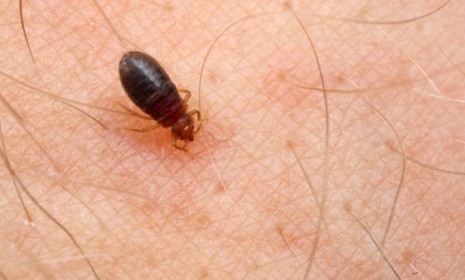Detecting bugs: Why humans have body hair
New research suggests that the nearly-invisible hairs covering the human body may help us sense the presence of bedbugs

A free daily email with the biggest news stories of the day – and the best features from TheWeek.com
You are now subscribed
Your newsletter sign-up was successful
Why is the human body covered in tiny, nearly-invisible hairs? New research from the University of Sheffield in Britain suggests that the fine hairs help the skin detect bloodsucking parasites — including bedbugs. Here's what you should know:
We're covered in tiny, nearly-invisible hairs?
There's body hair and then there's body hair. At first glance, seemingly smooth portions of the human body appear hairless. But that's not the case at all. "Per square centimeter, human skin has as many hair follicles as that of the other great apes," notes The Economist. "The difference," really, isn't in the number of hairs, but rather "in the fineness of the hair that grows from those follicles."
The Week
Escape your echo chamber. Get the facts behind the news, plus analysis from multiple perspectives.

Sign up for The Week's Free Newsletters
From our morning news briefing to a weekly Good News Newsletter, get the best of The Week delivered directly to your inbox.
From our morning news briefing to a weekly Good News Newsletter, get the best of The Week delivered directly to your inbox.
Why is this?
According to The Economist, our apparent lack of hair (at least relative to apes) is an evolutionary trait that has been attributed "to everything from a putative aquatic period" in mankind's history to "the advantages of displaying a healthy skin to members of the opposite sex." But this new study indicates that the tiny hairs serve as an "alarm system" when parasitic bugs land on (or crawl onto) us.
How did researchers determine that?
In a controlled study, researchers took 29 "brave" university students and shaved a patch of hair from one of their arms. While students looked away, researchers placed bedbugs on the participants' arms (both shaved and unshaved limbs) and recorded two things: how long it took for the bugs to find a place to feed, and how long it took the subjects to detect the insect's movements. (The bugs, however, were removed before they began to feed.)
A free daily email with the biggest news stories of the day – and the best features from TheWeek.com
And what did they find?
Researchers discovered that body hair "significantly enhanced" people's ability to detect something crawling on them, says Charles Q. Choi at LiveScience. Namely, participants noticed bugs on the hairy arm "quicker" than the shaved arm, suggesting that hairs act much like a "motion sensor." It took the bugs longer to feed on hairier arms, "presumably because [the hairs] hindered movement," and men were "better" at detecting bugs than women because they are "generally hairier." But rest assured: "This does not necessarily mean that women are more likely to be bitten," notes Choi. "Blood-sucking insects likely prefer to bite hosts in relatively hairless areas such as ankles."
Sources: Daily Mail, The Economist, Live Science
-
 Political cartoons for February 15
Political cartoons for February 15Cartoons Sunday's political cartoons include political ventriloquism, Europe in the middle, and more
-
 The broken water companies failing England and Wales
The broken water companies failing England and WalesExplainer With rising bills, deteriorating river health and a lack of investment, regulators face an uphill battle to stabilise the industry
-
 A thrilling foodie city in northern Japan
A thrilling foodie city in northern JapanThe Week Recommends The food scene here is ‘unspoilt’ and ‘fun’